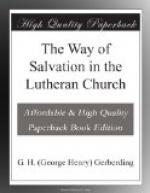But notwithstanding the immense array of opposition, we still believe that the Lutheran doctrine is nothing else than the pure teaching of God’s word. Where we have the “Church in the House,” there we have lambs of Christ’s flock. Ah, how many more we could have, how many more we would have, if the fathers and mothers in the Church understood this precious article of our faith, and prayerfully built their home life thereon! Then would there be a more regular and healthful growth of the Church, and the necessity for fitful, spasmodic revival efforts would cease. But we digress.
From our Christian homes the baptized children of the Church come to the Sunday-school. How is the school to treat them?—We speak now of the baptized children from Christian homes; we will speak of the unbaptized and untrained further on.
These children, with all their childish waywardness and restlessness, do generally love Jesus. They do trust in Him, and are unhappy when they know they have committed a sin against Him. They do, when taught, pray to Him, believe that He hears their prayers and loves them. Shall the teacher now begin to impress upon the minds and hearts of these little ones the idea that they are not yet Christ’s, and that Christ has nothing to do with them, except to seek and call them, until they are converted? And shall they go home from Sunday-school with the impression that all their prayers have been empty and useless, because their hearts have not been changed? Dare the Sunday-school thus confuse the child, raise doubts as to Christ’s forgiveness and love, and “quench the Spirit?” Oh how sad, that thus thousands of children have their first love, their first trust, quenched by those who have more zeal than knowledge!
No, no, these are Christ’s lambs. They come with His marks upon them. Let the Sunday-school teacher work in harmony with the mother who gave these children to Christ. Let the whole atmosphere of the school impress on that child the precious truth that it is Jesus’ little lamb. Feed that lamb, feed it with the sincere milk of the Word. Lead that lamb gently; teach it to understand its relation to the Great Shepherd, to know Him, to rejoice in His love, to love His voice, to follow His leadings more and more closely.
Instead of singing doubtfully and dolefully:
“I am young, but
I must die,
In my grave I
soon shall lie.
Am I ready now
to go,
If the will of
God be so?”
or,
“Child of sin
and sorrow
Filled
with dismay,
Wait not for to-morrow;
Yield
thee to-day:” etc.
or,
“Depth of mercy,
can there be
Mercy still reserved
for me?” etc.
or,
“Hasten, sinner,
to be wise,
Stay not for to-morrow’s
sun,” etc
or,
“I can but perish
if I go,
I
am resolved to try,
For, if I stay
away, I know
I
shall forever die.”




